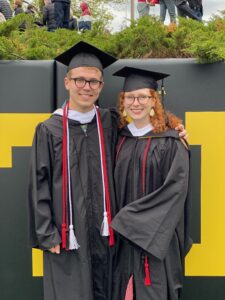In response to the U.S. Supreme Court Decision on Roe vs. Wade Gustavus graduates and members of the Digital Humanities Lab Austin Witt ‘22 and Kelly Carlson ‘22 wrote the following guest post on the research blog reflecting on to the revolutionary works of writer Adrienne Rich: poet, feminist, activist.

“The demand for legalized abortion, like the demand for contraception, has been represented as a form of irresponsibility, a refusal by women to confront their moral destiny, a trivialization or evasion of great issues of life and death.”
Poet and feminist, Adrienne Rich, wrote these words amid second wave feminism, the movement shaking ground on pay inequity, sex-based discrimination, domestic violence, and gender inequality. Unfortunately, almost half a century later, these realities continue to land on the White House’s desk, with minimal progress. The overturning of Roe V. Wade (1973) by the United States Supreme Court left our nation in shock – shattering years of progress that feminism has made in the past. However dismayed we remain, we turn to Rich’s work as a model of solidarity, equality, and hope, which our country desperately needs.
We, Austin Witt ‘22 and Kelly Carlson ‘22, alongside Dr. Nissa Parmar of the English Department, have begun researching the world of Adrienne Rich (2012) and the proliferation of her work, as part of the introduction to Digital Humanities at Gustavus. Through reading Rich’s work, such as Of Woman Born (1976) and others, it is clear that the struggle for feminine autonomy continues to exist in today’s social and political climate, much like that of the 60s forward. Adrienne Rich fought to redefine traditional roles and expectations of women in society, proving that a male-centered system of power creates fear and guilt in the feminine body, and distorts consciousness of decisions and inherent autonomy. Today, on June 24th, we grieve at how works like hers remain silenced, overpowered, and ignored. Through our piloted project, we hope to create a resource to bring these voices to a wider audience, reaching a national agenda.
50 years ago, 3 years after the initial passing of Roe v. Wade, Rich writes:
“Abortion may be criminalized again within the next half-decade or less. If so, thousands of women will die in pain and loneliness from botched illegal abortions or self-abortions. Poor women will suffer most and have the highest mortality. Racketeers of abortion will make thousands of dollars, and conscientious practitioners willing to risk themselves (including women helping other women) will go to, or risk, prison.”
Unfortunately, Rich’s words proved true: criminalized abortions became reality once again. And, let us not forget the intention of such a decision as the Supreme Court’s on Friday, which Rich interprets as:
“trivializ[ing] women’s impulses toward education, independence, self-determination as self-indulgence. Its deepest unwritten text is not about the right to life, but about women’s right to be sexual, to separate sexuality from procreation, to have charge over our procreative capacities.”
Realities have not changed; however, people’s consciousness has. Women, mothers, and young girls expect more of our nation, a place that thrives on feminine contributions, community, and inclusion in the workplace, classroom, and courtroom. We recognize also the impact on transgender men and the LGBTQ+ community. Rich wrote of a dream, a reality that has yet to reach consensus: equality. She writes:
“No free woman, with 100 percent effective, nonharmful birth control readily available, would “choose” abortion.”
This is a fact, known throughout our society for generations, that emphasizes the digression and intentions of patriarchal power. It is the ancient, ashen heap of history that keeps oppression proliferating. There is life in overturning Roe v. Wade, but no life worth living. Fetal disorders, increased rates of death in pregnancy (especially for women of color), increased poverty for all women, increased unwanted children in foster care, and decreased literacy rates among women in America are few of the things we can expect in the coming decision.
Despite this, Rich writes:
“Safe abortion on demand is merely one of the issues on which we must come together… [and] open the gate to a new kind of human community.”
When faced with a time saturated with rising inflation, increased infections, and unprecedented uncertainty of our future, we cannot forget the basic elements of our society: democracy is run by the people, and that means you and me. As we continue to read Rich’s work, and other contributions to the feminist movements (Mary Wollstonecraft, Audre Lorde, Mary Daley, the Combahee River Collective, Toni Morrison, Angela Davis, etc.), it is clear the only way to combat individualist, nationalist, and ignorant ideology is by coming together as a community. Solidarity: mutual support of like peoples, uniting by feelings, intentions, and common interests.
It is time we listen to the extraordinary authors before us and begin building a new humanity: one that emphasizes community, equality, and love. When we stand together, we can change our reality. The “law of the land” is in our hands. Let’s rewrite the narrative and be ‘of woman born,’ but protected, visible, understood, and equal.
For more information or to engage further with this issue you can consult the following websites:
- PlannedParenthood: https://www.plannedparenthood.org/get-involved/other-ways-give
- The Center for Reproductive Rights: https://reproductiverights.org/?df=y
- The National Black Women’s Reproductive Justice Agenda: https://blackrj.org/
- Indigenous Women Rising: https://www.iwrising.org/
- Dave Thomas Foundation for Adoption: https://www.davethomasfoundation.org